Smokey Robinson & the Miracles’ ‘Going to a Go-Go’: Life of the Party
by Mark Leviton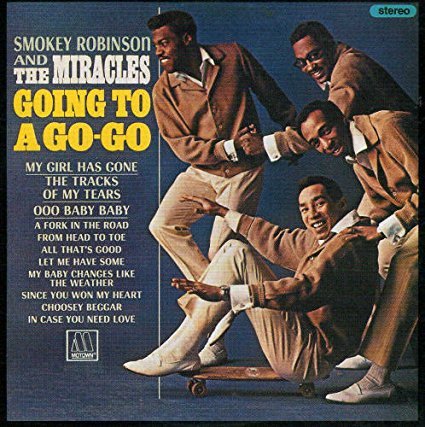 For most of its early history, the Motown label focused on producing 45 rpm singles. Like most independent record company heads in the ’50s and ’60s, Berry Gordy considered the issuing of 12-inch long-playing albums a sideline to the main job of promoting individual songs to radio stations and record shops.
For most of its early history, the Motown label focused on producing 45 rpm singles. Like most independent record company heads in the ’50s and ’60s, Berry Gordy considered the issuing of 12-inch long-playing albums a sideline to the main job of promoting individual songs to radio stations and record shops.
In 1965, their sixth year of operation, Motown released 70 singles, but only about a dozen non-compilation LPs (and the majority of those were by their biggest hitmakers, the Supremes, Marvin Gaye and the Four Tops). Smokey Robinson and the Miracles’ Going to a Go-Go, released in November on the Tamla imprint, was the only album by that act to make the Billboard top 10 during the ’60s, peaking at #8, although it achieved #1 on the separate R&B LP chart.
Going to a Go-Go contains four hit singles, programmed in a row from the first cut on side one, and eight other songs, only one of which was not written by William “Smokey” Robinson and his collaborators in the Miracles and from Motown’s stable of composers and arrangers. There are a few missteps on the disc, but working with frequent co-producers William “Mickey” Stevenson and Frank Wilson, Robinson and his close-knit vocal group achieve a work of art that justifies its length, and maintains a pretty consistent feel.
Robinson, born February 19, 1940, and now with more than 60 years of hits in his catalog, always likes to tell the story of showing Berry Gordy his first hundred songs in 1957, when Smokey was 17 years old: “He proved to me 99 of them were garbage,” he says. Only one, “Mama Told Me,” survived as the B-side to the Miracles’ first single, the answer record “Got a Job,” which tanked.
As he elaborated for Hit Parader magazine in 1968, “Every one of my songs that I showed to Berry, he criticized. He told me exactly what was wrong with them. So I threw all those songs out. Then I started from scratch, using the things Berry told me. I’d say that Berry has been the greatest thing that ever happened to me. He’s fantastic. He’s helped me in every way.”
Influenced by the Moonglows, the Mills Brothers, the Drifters, the Spaniels, the Clovers and other popular vocal groups, Robinson kept honing his craft until his first real hit, “Shop Around,” in 1960, set him on a firm path. Today, he’s considered one of the greatest songwriters ever, famously hailed as a poet by none other than future Nobel Prize in Literature Laureate Bob Dylan. Robinson’s craftsmanship is impeccable, his rhymes and melodies often surprising even after multiple listens.
As complex and erudite as his conceptions can be, he’s never opaque or confusing. He once told Rolling Stone’s Michael Lydon, “My theory of writing is to write a song that has a complete idea and tells a story in the time allotted for a record. It has to be something that really means something, not just a bunch of words on music.”
Penned by Robinson with Miracles bass singer Warren “Pete” Moore and their guitarist Marv Tarplin, “Tracks of My Tears” comes first on the LP. It has one of the greatest opening lyrics of all time: “People say I’m the life of the party/’Cause I tell a joke or two/Although I might be laughing loud and hearty/Deep inside I’m blue.” The instrumental backing from the rotating Motown crew known as the Funk Brothers, plus members of the Detroit Symphony Orchestra, is full of vigorous detail, and Robinson’s falsetto is set like a precious stone in the singing of his wife Claudette, and Miracles baritone Ronnie White and tenor Bobby Rogers. “That song,” Robinson told Rolling Stone, “started with a riff Marvin Gaye came up with. We worked it over for two months trying to get it in the pocket.”
The upbeat “Going to a Go-Go” actually did a couple places better than “Tracks of My Tears” in Billboard. That’s probably the expert timekeeper William “Benny” Benjamin on drums and the ever-active James Jamerson on bass. The insistent guitar riff and call-and-response vocals won’t let go as the track achieves a combination of swing and funk, with characteristic Motown percussion contributing much punch. There’s a delicious tenor sax solo, probably played by Hank Cosby. The vintage slang is part of the charm: “It doesn’t matter if you go stag/It doesn’t matter if you go drag” means by yourself or with a date.
“Ooo Baby Baby” has attracted numerous covers over the decades (sometimes titled “Ooh Baby Baby”), never losing its power, whether sung by Ella Fitzgerald, Todd Rundgren or Linda Ronstadt. The giant Miracles fan John Lennon was so impressed by the “I’m crying” section that he repurposed it for “I Am the Walrus.” Written by Robinson and Moore, it’s an aching lament, as right off the bat the singer begs to be forgiven for cheating (“I did you wrong/My heart went out to play”) before undermining his own argument by prevaricating (“Mistakes, I know I’ve made a few/But I’m only human/You’ve made mistakes too”). Still, the primal, brief chorus displays the singer’s pain with a melody that soars, and Smokey’s falsetto has never been more supple.
“My Girl Has Gone” is sung by another poor guy who’s lost his love and is in a miserable state, soothing himself with a pep talk that might not be working: “Now all I can say to comfort myself/Is that my girl has gone and said goodbye/Don’t you cry, hold your head up high/Don’t give up, give love one more try.” It starts with guitar and backing vocal parts that evoke the opening moments of “Tracks of My Tears,” and continues with a similar level of emotion. Listen to how Robinson’s lovely and loose vocal improvisations between 1:20 and 1:40 float above the background voices, an effect brought back during the long coda.
“In Case You Need Love” is written by Robinson alone, and borrows some of its rhythm arrangement from Marvin Gaye’s 1963 “Hitch Hike.” It’s a bit of a damp squib, bested by what comes next, “Choosey Beggar.” That has some typical humorous Robinson wordplay, coining a new word right away: “Beggars can be choisey, I know/That’s what the people say/But though my heart is begging for love/I’ve turned some love away.” The arrangement builds from the verse to a rousing but simple chorus, sounding more than a little like “More Love” would two years later.
The LP’s second side begins with a Robinson-Stevenson tune, “Since You Won My Heart,” which sounds more like a ’50s doo-wop number, triplets galore, than anything else here. Claudette Robinson takes a prominent role, and it’s completely delightful. Robinson’s solo composition “From Head to Toe” comes next. The song is great, but this original version inexplicably wasn’t issued as a single, although Motown got a British hit with Chris Clark’s 1967 version for their U.K. affiliate. (Elvis Costello and the Attractions cut a groovy rendition in 1982 too.)
The Miracles’ version, with piano and drums leading the way, is a bouncy confection that uses its stop-time section to maximum effect. It’s one of those unsung Motown productions that shows how the “Hit Factory” sometimes was too busy to notice they’d done something special. Unusually for a Miracles track, it has a key modulation—and listen for the sly Jackie Wilson reference when Robinson sings “fine, fine, fine.”
“All That’s Good” has some jazz touches, including a tenor sax solo and nice underpinning from organ, but has unrealized potential and never takes off. “My Baby Changes Like the Weather” was written by Hal Davis and Frank Wilson, and is handled like a hybrid big-band jazz/R&B number, the kind of thing Ray Charles might try. Around 1:30 and after there’s some very substandard background singing that mars the track and makes you wonder what it’s doing here. How it made it past Motown’s famed quality control is a mystery.
“Let Me Have Some” sounds like it’s ripping off the Fiestas’ “So Fine” of 1959, amped up with more hand-clapping and brass, but it has its own integrity. “A Fork In the Road,” by Moore, Robinson and White, ends the LP with a virtual clone of the “Ooo Baby Baby” arrangement wrapped around a truly magnificent Robinson lead vocal. The lyrics warn that romantic partners sometimes take different bends in the road, and goes further to describe love as a burden: “Seems like love should be easier to bear/But it’s such a heavy load/Worldwide travelers, you ain’t been nowhere/’Til you’ve traveled down love’s road.” It’s a fitting end to an album that’s been mostly about heartbreak.
Rolling Stone magazine’s periodic lists of the best 500 albums of all time always contain Going to a Go-Go, although its position has fluctuated to as low as 412 in 2020. After its release in ’65, the set took a long time to sell 500,000 copies, finally officially earning “gold” status in 2003. Naturally, when Robinson performs nowadays, he still does a number of songs from this excellent collection [available here].
[Robinson’s enormous recorded legacy is available in the U.S./worldwide here, in Canada here and in the U.K. here.]
Watch Smokey Robinson perform “The Tracks of My Tears” live
Related: An appreciation of Smokey Robinson

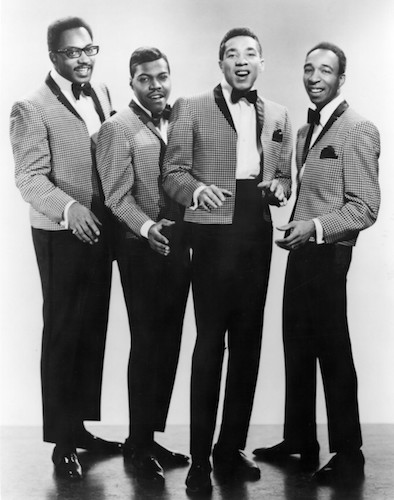
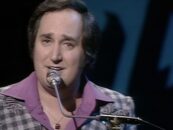
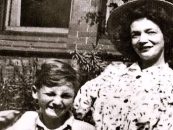
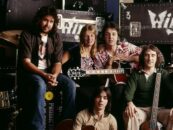
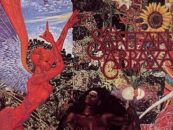

1 Comment so far
Jump into a conversationThe words of “Choosey Beggar” are “Beggars can’t be (choosy, choisey, choicy, whatever), not “Beggars can …”.